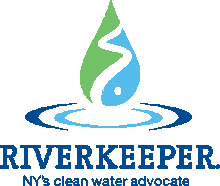Riverkeeper
 | |
| Formation | 1966 (Hudson River Fishermen's Association) |
|---|---|
| Headquarters | Ossining, New York |
Hudson Riverkeeper | Paul Gallay |
| Website | riverkeeper.org |
Riverkeeper is a non-profit environmental organization dedicated to the protection of the Hudson River and its tributaries, as well as the watersheds that provide New York City with its drinking water. It started out as the Hudson River Fisherman's Association (HRFA) in 1966. In 1986, the group officially changed its name to Riverkeeper, making it the first "keeper" group to be founded. In 1999, the Waterkeeper Alliance was created as an umbrella organization to unite and support "keeper" organizations.
Riverkeeper's mission is "to protect the environmental, recreational and commercial integrity of the Hudson River and its tributaries, and safeguard the drinking water of nine million New York City and Hudson Valley residents."[1] Paul Gallay is president of the organization.[2]
History[]

The Hudson Valley has long been considered the birthplace of the modern American environmental movement. In the 1960s a small group of scientists, fishermen and concerned citizens led by Robert H. Boyle, author of and a senior writer[3] at Sports Illustrated, were determined to reverse the decline of the then-polluted Hudson River by confronting the polluters through advocacy and citizen law enforcement.
In 1983, HRFA hired John Cronin.[4]
In 2000, eight of the 22 members of Riverkeeper's board resigned after Kennedy insisted on rehiring William Wegner, a scientist whom the organization's then-president, Boyle, had fired as soon as he had learned Wegner had been hired six months earlier. In 1995, Wegner had been convicted of smuggling rare bird eggs from Australia and had also pled guilty to tax evasion. Boyle and the board members who resigned believed it was not right for an environmental organization to hire someone convicted of environmental crimes, especially since critics would not hesitate to publicize that fact to gain a publicity advantage. Treasurer John Fry, who also resigned, felt it would hurt the organization's fundraising. Boyle was also further displeased that Kennedy had made an employment decision, since that was solely his responsibility within the organization.[5] Kennedy, who had hired Wegner to work for him personally after Boyle had fired him, said Wegner had done "terrific work" for Riverkeeper and no one, even those who had resigned over the hiring, disputed that. "We all make mistakes in our lives," he told The New York Times. "Where would any of us be if we didn't get a second chance?"[5] As of 2017 Wegner remains employed by Riverkeeper.[6]
Riverkeepers has advocated for the closure of the Indian Point nuclear power plant.[7] Riverkeepers argued that the power plant killed fish by taking in river water for cooling[7] and that the power plant could cause "apocalyptic damage" if attacked by terrorists.[8]

See also[]
References[]
Notes[]
- ^ "Our Methods". Riverkeeper. Retrieved 3 May 2017.
- ^ "About Us| Our Team". Riverkeeper. Retrieved 24 March 2017.
- ^ "Books of The Times". The New York Times. July 7, 1983. Retrieved 2008-01-16.
- ^ "About Us". Waterkeeper. Retrieved 3 May 2017.
- ^ a b Worth, Robert (June 22, 2000). "Eight at Riverkeeper Resign Over Kennedy's Hiring of a Rare-Egg Smuggler". The New York Times. Retrieved July 12, 2017.
- ^ "William Wegner". Riverkeeper. 2009–2017. Retrieved July 12, 2017.
- ^ a b Helmore, Edward. "New York Indian Point nuclear plant shuts down, ending an era". Mother Jones. Retrieved 2022-02-09.
- ^ Wald, Matthew L. (2004-09-08). "Group Says Terror Attack on Indian Point Would Be Apocalyptic". The New York Times. ISSN 0362-4331. Retrieved 2022-02-09.
Bibliography[]
- Cronin, John Jr., and Robert F. Kennedy. (1999). The Riverkeepers: Two Activists Fight to Reclaim Our Environment as a Basic Human Right. New York: Simon and Schuster. ISBN 978-0-684-84625-5
- Gottlieb, Robert. (2005). Forcing the Spring: the Transformation of the American Environmental Movement. Washington D.C.: Island Press.
- Kennedy, Robert F. Jr. (2000). "Risk, Democracy, and the Environment". In Gail Charnley, John D. Graham, Robert F. Kennedy, Jr., and Jason Shogren, "1998 Annual Meeting Plenary Session: Assessing and Managing Risks in a Democratic Society," Risk Analysis 20(3):301-316.
External links[]
- Hudson River
- Organizations established in 1966
- Water pollution in the United States
- Nature conservation organizations based in the United States
- Community organizations
- Fishing and the environment
- Environmental issues in New York (state)
- Environmental law in the United States
- Water organizations in the United States
- Environmental organizations based in New York (state)